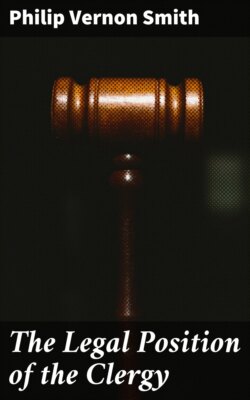Читать книгу The Legal Position of the Clergy - Philip Vernon Smith - Страница 16
На сайте Литреса книга снята с продажи.
Оглавление10. The bishop is not only the ruler and administrator, but also the chief pastor of the whole of his diocese. As such, he, assisted by his chaplain, has the right whenever he pleases, without the consent of the incumbent, to conduct service or preach in the church of any parish in such lawful manner as he thinks proper. This right extends to consecrating a church within the parish[16] and, of course, to holding ordinations and confirmations. Moreover, he can require from the clergy all reasonable information respecting their parish and parishioners. They owe to him canonical obedience,[17] and deference in matters which do not fall within the limits of obedience. With the exception that his withdrawal of a licence from a curate is subject to an appeal to the archbishop, he possesses absolute control over the unbeneficed clergy in his diocese, having the right to inhibit them from officiating within it. But he has no such power over the beneficed clergy in respect of their services in their own church and other matters involved in the cure of souls attaching to their benefice. In respect of these matters, their office being a freehold for life, they are independent of him except in such particulars and to such extent as the law has expressly prescribed, and they can only be constrained by him against their will through the instrumentality of legal proceedings. But, equally with the unbeneficed clergy of the diocese, it is their duty to attend the bishop's triennial visitations; and their absence without sufficient cause renders them liable to ecclesiastical censure and punishment. Moreover, as will be noticed in the course of this treatise, the bishop has been given, by express enactments, divers powers in relation to both beneficed and unbeneficed clergy on matters of detail, subject in many cases to an appeal to the archbishop of the province. By law and custom part of the administrative functions of the bishop and almost the whole of his judicial functions are discharged by his chancellor, who is at once his vicar-general and the official principal of his consistory court. Suffragan bishops, where they are appointed, have no independent authority or jurisdiction, but simply so much as the diocesan bishop, in his discretion, from time to time delegates to them.
